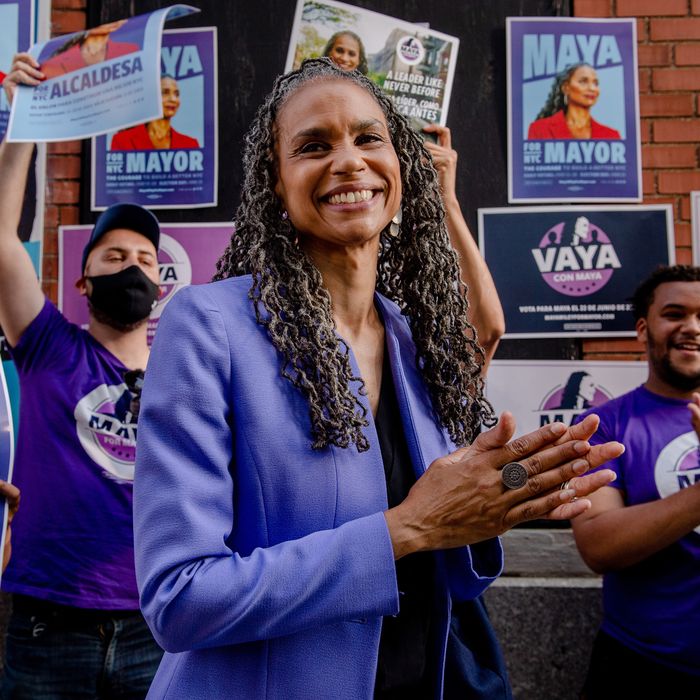
Maya Wiley stood under the arch of Grand Army Plaza in Brooklyn on Saturday evening as a light drizzle fell on her and over a dozen members of the group Jews for Racial and Economic Justice, who were there to light a candle to celebrate the end of the Sabbath. Around her were several people in Wiley campaign gear, including her family’s rabbi. After the service, the attendees were encouraged to text 20 friends each and tell them to “rank Maya #1.”
It was a major change from less than a month ago, when the group’s first choice for the Democratic nomination for mayor was Dianne Morales. Back then, Wiley was barely their second choice — the group urged people to rank either her or Scott Stringer second on their ballots.
Since then, Morales’s “beautiful mess” of a campaign disintegrated amid labor strife that led top staffers to resign and most of the left-wing hopeful’s endorsers to back away. Stringer had already lost many of his endorsers over a past allegation of sexual misconduct before a second accuser came forward early this month.
Now Wiley is trying to pick up their rubble and cobble together a coalition that combines support from both white progressives as well as Black and Latino voters. If she can do it, her path to victory in the Democratic mayoral primary would be the same one that propelled her old boss Bill de Blasio to victory against a splintered Democratic field in 2013, with 41 percent of the vote. Progressives had always liked Wiley, but they were lukewarm on voting for her. Now she’s the only hope they have left to stop Eric Adams, Andrew Yang, and Kathryn Garcia, all of whom are center-left.
Wiley told Intelligencer during a campaign appearance in Brooklyn that she is “unapologetically progressive,” but was careful to describe those backing her as “a multiracial coalition that includes progressives,” while also touting their geographic diversity.
Be it the result of circumstance, strategy, and/or skill, polls have shown Wiley surging in the final weeks of the campaign, after lagging behind better-known candidates for much of the race. She has also amassed a substantial list of backers including SEIU 1199, the city’s largest union, Representatives Hakeem Jeffries and Jamaal Bowman, and perhaps the most coveted endorsement in New York City Democratic politics: Alexandria Ocasio-Cortez.
“Maya Wiley is the only candidate in this race who had the opportunity to become the movement candidate,” Jeffries told reporters on Sunday during a campaign stop in Brooklyn. He touted her ability “to appeal to significantly African American and Latino communities that have often been left behind,” as well as “progressive communities all across the city of New York.” He resisted any comparison to de Blasio, however, describing this group of voters as “the Obama coalition.”
Whatever the term, Wiley seemed to be a magnet for people of all races during a street festival in Bed-Stuy on Sunday — at one point hula-hooping for the cameras.
Louise Lauren, a 29-year-old white woman, had just finished casting an early vote for Wiley — and none for the other top three candidates — when she rushed in to embrace her and pose for a picture. Lauren said she is for Wiley “very simply, because she’s a Black woman. This city is a very diverse city. We don’t need white men running the city any more,” adding that she “liked her platform on the police.”
Wiley’s main message has been casting herself as a progressive outsider. A former top aide to de Blasio who has carefully tried to separate herself from her former boss, she also served as chairwoman of the Civilian Complaint Review Board with some oversight of the NYPD, and she has emphasized that role, as well as her past as a civil-rights attorney, as her qualifications to reform the police and advance racial justice in the city.
Her pitch seemed perfectly timed for the mood of Democrats when she jumped into the mayoral race last year following a summer of massive protests against racism, the police, and de Blasio in the aftermath of George Floyd’s murder. At the time, “defund the police” was a trendy slogan on the left, and de Blasio and the city council acquiesced to the demand by pushing through a budget that cut funding for the NYPD by $1 billion (although much of that reduction was accomplished through accounting tricks).
Since then, violent crime has continued to surge in the city, particularly in Black and Latino areas, in addition to a wave of attacks against Asians. Crime is a top issue for nearly half of Democratic voters, according to a recent poll by NY1, but less than 20 percent of voters think there should be fewer cops on the street. It’s no coincidence that of the top four candidates, both Garcia and Yang are against defunding the police and so is the front-runner, Adams, a former NYPD captain. Wiley has taken aim at Adams for offering qualified support for the police tactic of “stop and frisk,” which has been predominantly used against Black and Latino men.
“What the left is discovering is using progressive talking points on crime has been overwhelmingly alienating to parts of the voting population who have been historically open to progressive politics at a national level, but who felt effects of this rise in crime in their daily lives,” one operative on a rival campaign told Intelligencer.
So while “Mayamentum” may have finally consolidated the left, the political dynamics of New York mean that she may have only consolidated a minority of voters on the eve of a historic ranked-choice election, in which candidates need to win at least 50 percent of votes to win. The final result, of both Wiley’s coalition-building and the election she is trying to win, may not be known for weeks to come.





























